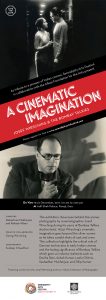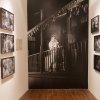Curated By Debashree Mukherjee and Rahaab Allana
The Serendipity Arts Festival in association with Alkazi foundation for the Arts showcased for the very first time, a sampling of rare, original photographs and digital reprints of early Indian cinema from the Wirsching Archive. The selection for the exhibition comprised behind-the-scenes photographs of cast and crew, production stills, and publicity images.These photographs, shot primarily on 35mm with a Leica camera between the 1920s – 60s, give us unprecedented access to the aesthetic decisions, creative communities, and cross-cultural exchanges that were vital to filmmaking in late colonial India. The acclaimed production studio, Bombay Talkies, played a major role in defining the form of mainstream film in India. This exhibition foregrounds the critical role of German technicians and interwar image-making practices in the history of Indian cinema.
A dynamic group of cosmopolitan artists – the actor and producer Himansu Rai, director Franz Osten, and cinematographer Josef Wirsching – met in Munich and collaborated on the classic silent film, Light of Asia (1925), which was shot in India. During the dramatic rise of the Nazi party in Germany, Osten and Wirsching decided to accept Himansu Rai’s offer to help start up a talkie studio in Bombay. Together, this creative Indo-German team produced some of the most iconic musical films of the era, such as Jawani ki Hawa (1935) and Achhut Kanya (1936), which dealt with urgent social reform and nationalist issues of day. The studio also trained some of the best-known actors and technicians of Indian cinema, from Ashok Kumar and Leela Chitnis, to Jairaj, Hansa Wadkar, and Dilip Kumar. Josef Wirsching’s career endured into the post-independence years with films such as Mahal (1949), Dil Apna Preet Parai (1960) and Pakeezah (released later in 1972). His cinematic vision infused Bombay cinema with the psychological depth and drama of the German Expressionist style. This exhibition, based on an archive lovingly preserved by his family was presented as a tribute to Josef Wirsching, one of the forgotten pioneers of Indian cinema.









